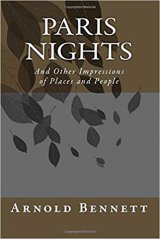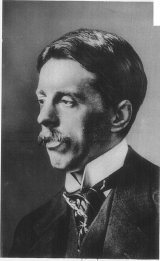Paris Nights and Other Impressions of Places and People Page #16
Enoch Arnold Bennett (27 May 1867 - 27 March 1931) was an English writer. He is best known as a novelist, but he also worked in other fields such as the theatre, journalism, propaganda and films. Bennett was born in a modest house in Hanley in the Potteries district of Staffordshire. Hanley was one of the Six Towns that were joined together at the beginning of the 20th century as Stoke-on-Trent and are depicted as "the Five Towns" in some of Bennett's novels. Enoch Bennett, his father, qualified as a solicitor in 1876, and the family moved to a larger house between Hanley and Burslem.
- Year:
- 1913
- 106,037 Views
***** The famous, the notorious foyer de la danse was empty. Here was an evening given exclusively to the ballet, and not one member of the corps had had the idea of exhibiting herself in the showroom specially provided by the State as a place or rendezvous for ladies and gentlemen. The most precious quality of an annual subscription for a seat at the Opéra is that it carries with it the entry to the foyer de la danse (provided one’s hat is right); if it did not, the subscriptions to the Opéra would assuredly diminish. And lo! the gigantic but tawdry mirror which gives a factitious amplitude to a room that is really small, did not reflect the limbs of a single dancer! The place had a mournful, shabby-genteel look, as of a resort gradually losing fashion. It was tarnished. It did not in the least correspond with a young man’s dreams of it. Yawning tedium hung in it like a vapour, that tedium which is the implacable secret enemy of dissoluteness. This, the foyer de la danse, where the insipidly vicious heroines of Halévy’s ironic masterpiece achieved, with a mother’s aid, their ducal conquests! It was as cruel a disillusion as the first sight of Rome or Jerusalem. Its meretriciousness would not have deceived even a visionary parlour-maid. Nevertheless, the world of the Opéra was astounded at the neglect of its hallowed foyer by these young women from St. Petersburg and Moscow. I was told, with emotion, that on only two occasions in the whole season had a Russian girl wandered therein. The legend of the sobriety and the chastity of these strange Russians was abroad in the Opéra like a strange, uncanny tale. Frankly, Paris could not understand it. Because all these creatures were young, and all of them conformed to some standard or other of positive physical beauty! They could not be old, for the reason that a ukase obliged them to retire after twenty years’ service at latest; that is, at about the age of thirty-six, a time of woman’s life which on the Paris stage is regarded as infancy. Such a ukase must surely have been promulgated by Ivan the Terrible or Catherine!. . . No! Paris never recovered from the wonder of the fact that when they were not dancing these lovely girls were just honest misses, with apparently no taste for bank-notes and spiced meats, even in the fever of an unexampled artistic and fashionable success. [Illustration: 0119] Amid the turmoil of the stage, where the prodigiously original peacock-green scenery of Scheherazade was being set, a dancer could be seen here and there in a corner, waiting, preoccupied, worried, practising a step or a gesture. I was clumsy enough to encounter one of the principals who did not want to be encountered; we could not escape from each other. There was nothing for it but to shake hands. His face assumed the weary, unwilling smile of conventional politeness. His fingers were limp. “It pleases you?” “Enormously.” I turned resolutely away at once, and with relief he lapsed back into his preoccupation concerning the half-hour’s intense emotional and physical labour that lay immediately in front of him. In a few moments the curtain went up, and the terrific creative energy of the troupe began to vent itself. And I began to understand a part of the secret of the extreme brilliance of the Russian ballet. ***** The brutality of Scheherazade was shocking. It was the Arabian Nights treated with imaginative realism. In perusing the Arabian Nights we never try to picture to ourselves the manners of a real Bagdad; or we never dare. We lean on the picturesque splendour and romantic poetry of certain aspects of the existence portrayed, and we shirk the basic facts: the crudity of the passions, and the superlative cruelty informing the whole social system. For example, we should not dream of dwelling on the more serious functions of the caliphian eunuchs. In the surpassing fury and magnificence of the Russian ballet one saw eunuchs actually at work, scimitar in hand. There was the frantic orgy, and then there was the barbarous punishment, terrible and revolting; certainly one of the most sanguinary sights ever seen on an occidental stage. The eunuchs pursued the fragile and beautiful odalisques with frenzy; in an instant the seraglio was strewn with murdered girls in all the abandoned postures of death. And then silence, save for the hard breathing of the executioners!... A thrill! It would seem incredible that such a spectacle should give pleasure. Yet it unquestionably did, and very exquisite pleasure. The artists, both the creative and the interpretative, had discovered an artistic convention which was at once grandiose and truthful. The passions displayed were primitive, but they were ennobled in their illustration. The performance was regulated to the least gesture; no detail was unstudied; and every moment was beautiful; not a few were sublime. [Illustration: 0125] And all this a by-product of Russian politics! If the politics of France are subtly corrupt; if anything can be done in France by nepotism and influence, and nothing without; if the governing machine of France is fatally vitiated by an excessive and unimaginative centralisation--the same is far more shamefully true of Russia. The fantastic inefficiency of all the great departments of State in Russia is notorious and scandalous. But the Imperial ballet, where one might surely have presumed an intensification of every defect (as in Paris), happens to be far nearer perfection than any other enterprise of its kind, public or private. It is genuinely dominated by artists of the first rank; it is invigorated by a real discipline; and the results achieved approach the miraculous. The pity is that the moujik can never learn that one, at any rate, of the mysterious transactions which pass high up over his head, and for which he is robbed, is in itself honest and excellent. An alleviating thought for the moujik, if only it could be knocked into his great thick head! For during the performance of the Russian Imperial Ballet at the Paris Opéra, amid all the roods of toilettes and expensive correctness, one thinks of the moujik; or one ought to think of him. He is at the bottom of it. See him in Tchekoff’s masterly tale, The Moujiks, in his dirt, squalor, drunkenness, lust, servitude, and despair! Realise him well at the back of your mind as you watch the ballet! Your delightful sensations before an unrivalled work of art are among the things he has paid for.
Translation
Translate and read this book in other languages:
Select another language:
- - Select -
- 简体中文 (Chinese - Simplified)
- 繁體中文 (Chinese - Traditional)
- Español (Spanish)
- Esperanto (Esperanto)
- 日本語 (Japanese)
- Português (Portuguese)
- Deutsch (German)
- العربية (Arabic)
- Français (French)
- Русский (Russian)
- ಕನ್ನಡ (Kannada)
- 한국어 (Korean)
- עברית (Hebrew)
- Gaeilge (Irish)
- Українська (Ukrainian)
- اردو (Urdu)
- Magyar (Hungarian)
- मानक हिन्दी (Hindi)
- Indonesia (Indonesian)
- Italiano (Italian)
- தமிழ் (Tamil)
- Türkçe (Turkish)
- తెలుగు (Telugu)
- ภาษาไทย (Thai)
- Tiếng Việt (Vietnamese)
- Čeština (Czech)
- Polski (Polish)
- Bahasa Indonesia (Indonesian)
- Românește (Romanian)
- Nederlands (Dutch)
- Ελληνικά (Greek)
- Latinum (Latin)
- Svenska (Swedish)
- Dansk (Danish)
- Suomi (Finnish)
- فارسی (Persian)
- ייִדיש (Yiddish)
- հայերեն (Armenian)
- Norsk (Norwegian)
- English (English)
Citation
Use the citation below to add this book to your bibliography:
Style:MLAChicagoAPA
"Paris Nights and Other Impressions of Places and People Books." Literature.com. STANDS4 LLC, 2024. Web. 25 Dec. 2024. <https://www.literature.com/book/paris_nights_and_other_impressions_of_places_and_people_110>.




Discuss this Paris Nights and Other Impressions of Places and People book with the community:
Report Comment
We're doing our best to make sure our content is useful, accurate and safe.
If by any chance you spot an inappropriate comment while navigating through our website please use this form to let us know, and we'll take care of it shortly.
Attachment
You need to be logged in to favorite.
Log In